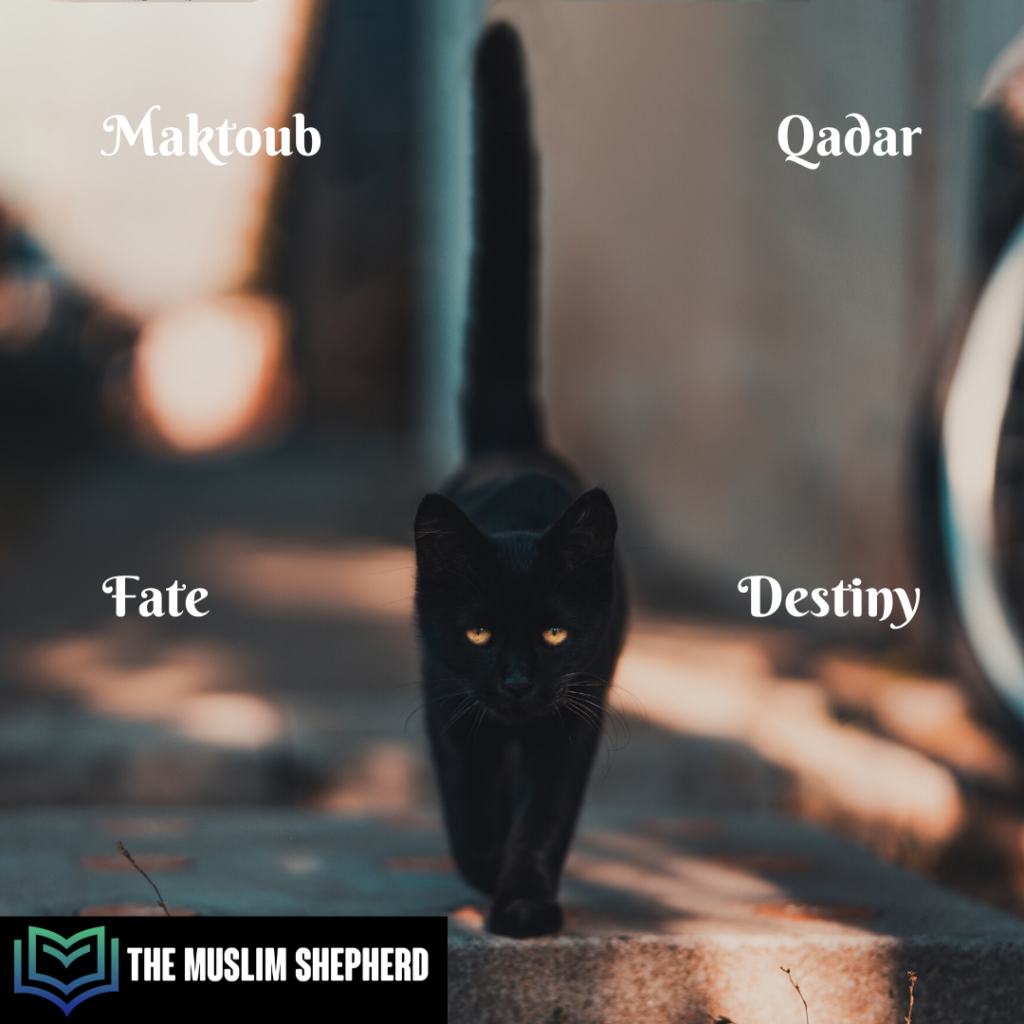My destiny is terrible. It’s all written.
How many Muslims become disempowered by this thought?
How many want to know if a better future awaits them?
The questions about destiny arise in times of difficulties and doubts.
When it happens, it’s important to have the right understanding.
Misconceptions about destiny bring negative outcomes in someone’s life.
It affects health, relationships, work, and connection to God.
That’s why it is important to highlight those misconceptions.
Then, we will learn from Adam (a.s.) how to approach destiny.
By the end of this post, you’ll know why you should be excited about your destiny.
When Misconceptions Ruin Lives
Different names for the same concept

Destiny has many names:
- Fate
- Predestination
- Maktoub
- Qaḍa and Qadar (divine decree and predestination)
The belief in destiny is one of the 6 pillars of iman (faith).
This is what the Prophet (s) answered Jibreel (Angel Gabriel) about what is Iman:
“It is that you believe in Allah and His angels and His Books and His Messengers and in the Last Day, and in qadar (fate), both good and bad.”
The idea behind qadar is, whatever happens, it happens according to Allah’s divine decree. Nothing happens without His will. Nothing happens He has no knowledge of.
“The keys of the Unseen are in His possession. No one knows them but Him. He knows everything in the land and sea. No leaf falls without His knowing it. There is no seed in the darkness of the earth, and nothing moist or dry which is not in a Clear Book.” [Quran 6:59]
But wait, if Allah knows everything and has already written the future in a book, where is my free will in all this?
This is where things get spicy.
It’s All Written: A Muslim Misconception

Free will vs destiny is an old debate that people from different faiths tried to answer.
Some Muslims respond to the qadar in a particular way.
They say something like: if it’s all written, I can’t do anything about it.
Adopting this fatalistic perspective is dangerous, disempowering, and debilitating.
If it’s already planned, what’s the point of doing the effort?
Why bother looking for a job, working hard, or improving oneself?
You can easily imagine the disaster of carrying this kind of thoughts day in and day out, year after year.
In your opinion, which individual has a high chance of succeeding in life? The one who makes the effort no matter what happens, or the one who’s waiting for things to happen?
As you can see, one answer empowers you, another makes you weak.
The purpose of Islam is not to make people weak. It’s quite the opposite.
What Allah wants from us is to have Tawakkul– trust in Him- no matter what happens.
But, is it really important to know if we caused the events of our lives or if they are from a divine decree?
Reframe Destiny and Free Yourself
The Story of Adam(a.s.) and Iblis (Satan)
In this lecture, Nouman Ali Khan explains beautifully the story of Adam (a.s.) and how it applies to our daily life.
So here’s how it started.
Allah told the angels He will put a vicegerent on earth:
“And [mention, O Muhammad], when your Lord said to the angels, “Indeed, I will make upon the earth a successive authority.” They said, “Will You place upon it one who causes corruption therein and sheds blood, while we declare Your praise and sanctify You?” Allah said, “Indeed, I know that which you do not know.” [Quran 2:30]
This conversation happened before the creation of Adam (a.s.).
From the beginning, Adam (a.s.) was created for the earth, not for Jannah (paradise).
The rest is history.
Iblis tempted Adam (a.s.) and Hawa (Eve). They ate from the forbidden tree. And all three were sent down to earth.
But here’s the interesting part.
Both Adam (a.s.) and Iblis disobeyed Allah.
What makes them different is their response.
Iblis blames Allah. As a result, he has been removed from paradise in disrespect and humiliation.
“[Satan] said, “Because You have put me in error, I will surely sit in wait for them on Your straight path.” [Quran 7:16]
On the opposite side, Adam doesn’t blame Allah. He asks for forgiveness. As a result, he’s been sent down in honor.
“Then Adam received from his Lord [some] words, and He accepted his repentance. Indeed, it is He who is the Accepting of repentance, the Merciful.” [Quran 2:37]
The difference between Adam (a.s.) and Satan is RESPONSIBILITY.
One took responsibility for his actions, the other didn’t.
Which Part Is Destiny and Which One Is Freewill

The lesson from Adam’s story is golden.
We should not concern ourselves with destiny— what is written and what is not.
The real question is: Are we taking our responsibilities?
The chances that God shares His plans with you are close to zero.
So what to do?
Focus on what you can control.
Don’t get into blaming mode.
The issue is not the event we’re facing.
The issue is our own chosen response to the situation.
There are verses in Quran showing that when God wants something, it happens. Nothing can change it.
But there’s also evidence that destiny changes with our actions.
The Messenger of Allah (ﷺ) said:
“Nothing increases one’s life span except righteousness and nothing repels the Divine decree except supplication, and a man may be deprived of provision by a sin that he commits.”
We can change our life with righteousness, good deeds, and supplications.
That opens the door for a rich life, with infinite possibilities.
Our actions matter. Our actions can change our destiny.
This is how we free ourselves from unhelpful thoughts: Responsibility.
3 Reasons You Should Be Excited About Your Destiny
Allah Is All-Wise
Life is not happening to you; it’s happening for you.
Allah doesn’t burden anyone with more than he can tolerate.
He knows your true capabilities.
Hardship can have many purposes.
Maybe He wants to purify you, to bring you closer to Him, or to make you step up a level.
Only Him knows.
If you’ve been tested and failed, it’s not the end of the world.
Do like our father Adam. Go back to Him, ask forgiveness, and move forward.
Whatever comes your way, there is a meaning behind it. Even if you can’t understand it now.
You can always transform your experiences into something of value.
Destiny Is Changeable

You can change your destiny anytime you want to. Only you can do it.
As Allah said:
“Indeed, Allah will not change the condition of a people until they change what is in themselves.”
Don’t confuse your decision-making with your destiny.
Take ownership of what’s happening to you and choose to act.
Anytime, you have the possibility to change the way you feel, think, and behave.
You’ve Got the Power

Look. Even when Allah granted victory to his Messenger, it didn’t stop him from working.
The Prophet (s) kept planning, taking precautions, consulting, preparing, praying, and making supplications to get Allah’s support.
Why?
He could lay down and let God do the work.
Because it’s not how it is supposed to be.
For anything to become a reality, you need to create enough reasons for it.
This is the source of your power.
You make your vision happen by creating the conditions for it.
Fortunately, there are only two conditions to remember: work and tawakkul (trust in God).
Conclusion
What the world needs is people like you.
The ones who believe they can make things happen.
Muslims who don’t complain, work tirelessly and rely on God for His support.
Don’t adopt those disempowering views—that your life is the way it is and you can’t do anything about it.
Focus on your efforts, please God, and watch the miracles come to life.
***TO YOUR DESTINY***
Article published: July 10, 2020
Popular Articles
- 7 Lessons from Luqman that Will Make You Wise
- How to Enjoy Salat and Make it Meaningful
- Mongols Invasions: Some Forgotten Lessons to Today’s Muslims
- For or Against Vaccines? That’s Not Really the Question
- Are Muslims Meant to Be Sleep Deprived?
- Islamic Psychology: A Model Where Faith Has Its Place
- Muslims Judging Each Other: Why and How to Be Less Judgy
- The Certainties of Muslims in Uncertain World
- Allah According to Allah: The Beauty Behind the Verse of Light
- Blindness: From the Invisible Gorilla to the Quranic Perspective
- How to Make People Change their Mind: Persuasion!
